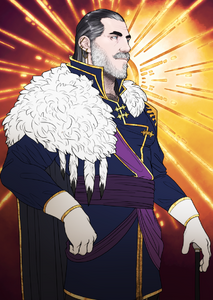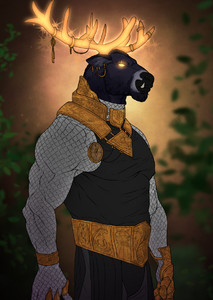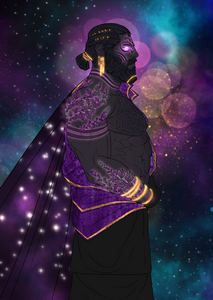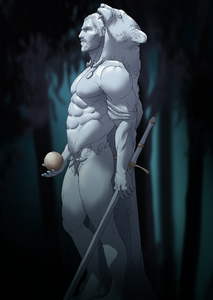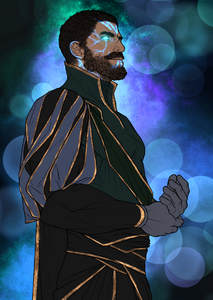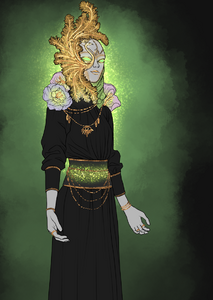More actions
| Unionism | |
|---|---|
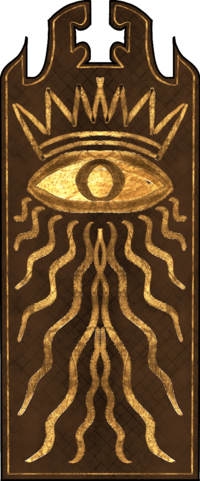 | |
| Religion | |
| Pronunciation | Union-ism |
| Origins | Emperor Theomar |
| Deities | |
| The Everwatcher and various other Gods and Goddesses | |
Unionism is the world's second-largest religion only trailing shortly after Estelley, on account of the Ailor people being more religiously divided, though it is speculated that Unionism will become the largest religion within a century at least. Unionism at its core is a global unification movement that proclaims the benevolence of the divinely inspired Emperors of the Regalian Empire to bring order, stability, and law to the world that is filled with chaos and strife. Unionism is the only Religion on Aloria that incorporates Gods of their subjugated or annexed people, preserving their culture and traditions as a part of a larger collective.
Origins
Unionism was founded several years after the Establishment of the Regalian Empire, roughly speaking in the year 10 AC. The exact year date is unclear, because Theomar did not publish the Creed until some time after he received his first visions, and so some theological debate exists on the exact founding year. Emperor Theomar was the first prophet of the faith and recorded the visions of the Everwatcher who joined with his soul, thus Theomar became the first Vessel-Emperor. Unionism has since its founding had a strong upward trajectory of convincing those of other Religions to it, but also just population growth in general due to its strong message of expansion of the state and family.
Central Message
The central message of Unionism is that the world must come to respect the moral and spiritually legal visions of the Vessel of the Everwatcher and adopt a common globalist or unifying vision of statehood. The world is filled with chaos and suffering through war, tyrannic despotism, religious oppression, and corrupting Demonic influences. Unionists believe that while they aren't wholly immune to these things themselves, they have the best position from which to disassemble these conditions in other countries by bringing a state of law and ending national strife by ending the concept of nationality. The aim is not to create a single nation identity but to dissolve the very concept of nation identity and borders and societal division. The easiest interpretation of this somewhat vague concept is that Unionists believe the whole world should be ruled by the Emperor (Vessel), and that when all war and conflict have left the world, the Everwatcher will stand before mortals and create forever paradise without death.
However, the situation on the ground is starkly different. Since the death of the prophet and the immediate explosion of violence through the schisms from within the religious community, Unionists have mostly abandoned the idea of a global empire building as entirely unfeasible and downgraded their expectation to that of a benevolent confederacy. While conquest wars do still happen through a lens of feudal conquest, the Empire largely expands through cultural, economic, or spiritual pressures, and what is officially called the Regalian Empire, acts more like a loose confederation of autonomous states. It is merely called an Empire to give the state the prestigious veneer of competing with the Allorn Empire, which is a political measure in time. While the Emperor's word is meant to be absolute, in reality, the Emperors are bound by so much scheming politics, that they often function more like mascots and are even removed from power or sidelined in direct violation of the Emperor's divine God-Emperor status.
Adherence to the central message of Unionism has largely disappeared from public discourse, as the political elite has hijacked its vague message to implant their own goals and ambitions. To many of the lay people and common worshipers, the Religion itself has been overtaken by so-called Crypto-Unionists, Unionists who proclaim "Long Live the Empire", but mean "Long Live Me". No other religion has such an external false presentation as Unionism, with class divide, in particular, causing a radically different experience and expression of faith among the poor versus the wealthy. Many believers still fervently believe in the Great Way (the term for this unitary peace state), but exist with the constant anxiety of knowing that the prophet's benign intent has long since been stained by bad actors both from within the faith and outside of it, who see it as nothing but a means to an end.
The Afterlife
Unionism's afterlife is far less colorful or pleasure-inducing than many other Afterlives, it is in fact quite simple. Unlike the paradises of liquor and endless banquets, Unionism's afterlife is a somber staircase upon which all the faithful sit in waiting, gazing down at the world of mortals and watching events unfold until it is their time to descend back down to the land of the living when the Everwatcher creates paradise. There is a sense of togetherness for those who will return to loved ones in the Afterlife, but also a sense of waiting for eternity due to the slow progression of the Great Way, and the many setbacks the Regalian Empire faces in its implicit world-unification plans.
Gods and Goddesses
Unionist Gods were either Gods from other Religions, or divinely blessed mortals who became immortal Gods after they passed on with the guidance of the Everwatcher. There is no important distinction between the types of Gods, Unionism treats all Gods equally under the Everwatcher. Each God also has associated Saints who become Immortal divine beings, but are not considered Gods, and discussed further down. The Everwatcher is technically the Arch-God, but this entity is so unknowable to anyone but the Emperor, that it is only invoked, not directly worshiped. The Everwatcher is treated as the creator of all the Gods, but the Gods are like tangible extensions of it, and thus they receive the worship instead.
Theomar, the Father
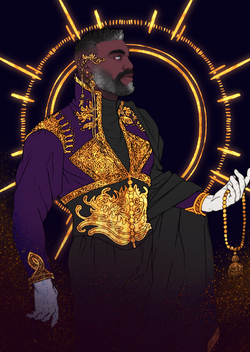
Theomar was the first prophet-Emperor of Unionism, the first Vessel of the Everwatcher, and the first to speak and write the holy word of the faith in the Creed. When the Regalian Empire was young, he was its first Emperor, having joined forces with the other major families in the Five Family Rebellion to overthrow the Kingdom of Amelore, banish the Bel Hammon Elves, and establish the Empire. Shortly after, he received visions and direct communication from the Everwatcher, who taught him the vision of Unionism. In life, he was considered a highly spiritual and immensely wise person, one of the tranquil Emperors of the Regalian Empire who did not wage wars, but convinced people foreign and his own to accept the word of the faith.
Theomar is the leader of the Unionist Pantheon and is often considered beyond reproach. While some of the other Gods lived flawed and sinful lives, Theomar represents an unblemished purity of the soul. He is the patron of anyone in the spiritual role of father or caretaker, leaders, generals, commanders, etc. From him, the faithful learn patience, diligence, and spiritual directives, even if Theomar himself is the least active of the Unionist Gods when appearing before the faithful or acting on their behalf as Divine intervention.
Ness, the Mother
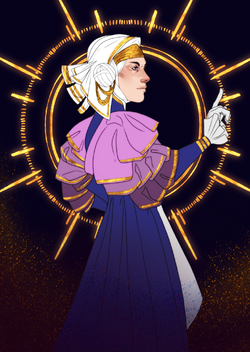
Ness was the 4th Empress of Regalia Nessaria Calontir, known in her early life as a woman of sinful indulgence and trustworthiness. Her life was filled with the pleasures of the Imperial royal court, absconding her duties and court protocols to reign as the mistress of the court. When her children were killed in a court conspiracy, a chance encounter with the assassins in prison changed her. It was said the Everwatcher spoke to her in her deepest moment of grief and blessed her with forgiveness and a nurturing spirit. From that moment on she donned the robe of the nurse vowing to bestow the blessing of care onto the sick and dying, that which had been denied her own children. She eventually passed on at the height of adoration by the people, a contrast to her early life.
Ness is the caretaker and nurturing mother of the pantheon, representing the idea that it is never too late to abandon one's wicked ways and reform in virtue. She is the patron of anyone in the spiritual role of mother or medical staff, midwives, healers, and those seeking to reform criminals to the light of the law. From her, the faithful learn compassion, sacrifice, and regret. Ness appears when the faithful need her the most when the only thing standing between them and certain death is her forgiving and healing light by their side.
Grace, the Custodian
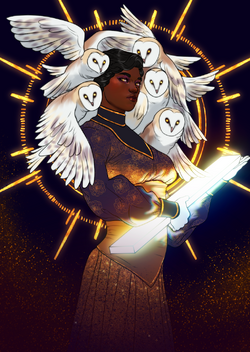
Grace was an old Hecarian Goddess, the spiritual leader of the Hecarian tribes that joined the Regalian Empire early in its creation but after Theomar spread his gospel. Grace (or Glanzia as she was called by them), was the Goddess mother of the night, bringing wisdom and judgment through her all-seeing owls. When the Regalian Empire peacefully integrated the Hecarian tribes through marriage by the hand of an Imperial Princess, Grace was incorporated into the Unionist Pantheon along with the other Gods from other Religions by her own free will. From that moment on, she became the Goddess of purity of soul and body, the custodian guiding the faithful to remain free of sinful corruption by otherworldly agents and to be judged by her gaze should they fall.
Grace is the protector of the purity of the faithful, with one hand shielding them from the corrupting influences of the other Dimensions, and with the other judging them should they fall to its vices and become agents of destruction. Her laws have ultimately been re-interpreted as a call for complete anti-magical/Occult purity, but her teachings to the faithful are more about controlling these things, not being controlled by it. She has granted the faithful Purestone, a material that rejects the Occult and protects the faithful from Magical harm.
Allest, the Champion
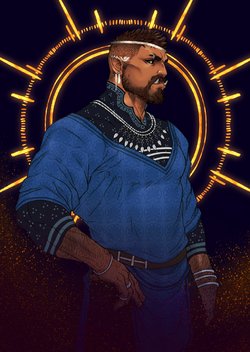
Allest was the 17th Emperor of Regalia Allestrain I Ivrae who lived an angry and violent life. Being one of the few Eronidas Emperors of Regalia, he oversaw some of Regalia's most brutal wars of expansion particularly against the Velheim people. He however also dealt his own nobles an unjust hand, often ignoring the law and justice system in favor of honor duels that would end in a bloodbath. It is said, however, that by the guidance of his Chancellor Alexander the First (nicknamed Brand), he found religious purpose and divine directive. His anger was channeled into the arena where he became a glorious gladiator-emperor, and his combat prowess to foreign wars. With all his rage vented, his rule became one of strict but fair discipline that saw major legislative expansions.
Allest is the Lion-God of the pantheon, the patron of soldiers and gladiators, teaching them honesty, and bravery, and praying for victory. It is known by the faithful, however, that his soul was ensnared by wicked plots from the Vola Fornoss Gods to punish him for the crusades and genocide against their people. As such, his divine throne in the Pantheon remains empty, with his Saint Brand appearing to those who invoke or pray to his name, as he cannot hear them while imprisoned in the hellish Demon-realm of Vaarda, the Vola afterlife.
Caan, The Magus
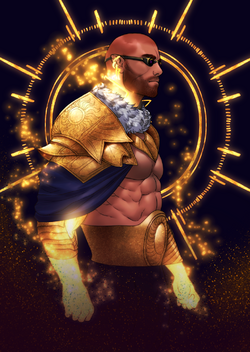
Caan was an old Breizh God, the leader of the Santel pantheon, who both led the people of Kintyr to join the Five Family Rebellion and in founding the Aelrrigan Order prior. Because Caan was present when the Regalian Empire was founded, he was the first God from another faith to voluntarily join the Unionist pantheon, making the other Santel Gods his saints. While all Santels had white feathered wings, it is said that Caan removed his wings as a virtuous sacrifice to walk more closely with mortals and understand their plight and needs. Over time, however, he has seemingly become more detached and cynical. While he still lives among mortals as a God, he has become quiet and unresponsive, which many of the faithful have blamed on the constant abuse of Magic in the Empire.
Caan is the patron God of all the Mages and those gifted with Magic in the Empire, teaching them responsible use of their Magic and to use their gift or burden for the Good of the Empire, not to spite it. He is by far the most active of the Gods among mortals because he leads the Aelrrigan Order after ousting the mortal leadership he put in place centuries ago, but comes and goes without rhyme or reason, having fallen into a melancholic unapproachability that makes even the faithful uneasy to be around him when he appears in person.
Elia, the Huntress
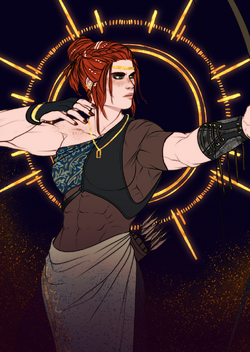
Elia was the Empress-wife of Emperor Allestrain (the God Allest) who had a difficult life. Originally destined to become a Knight, she was forced to surrender her life ambitions and goals when the Emperor chose her for a marriage (later known as a beard marriage). Her obsession with Knights and her dreams made her a terrible Empress, but much like her husband, she found guidance from the Chancellor's wife Leona who would later go on to become her Saint. While Elia was prone to fits of obsessive compulsion, Leona was her temperance, bending her uncollected and uncoordinated actions and thoughts into precision actions and decisions. She carried on the work of her husband after he was killed by the Vola Gods, and finished the work of war against the Skags.
Elia is the patron Goddess of Knights and hunters, but also more widely speaking anyone who needs to cast away distractions in favor of single-minded focus and concentration. She teaches the virtues of calmness, self-control, and clarity, so that the faithful remain aware and truthful to themselves, and act without a shroud in their mind onto others. Elia was a multi-discipline warrior famed with bow and halberd alike, and thus prayed to by the faithful for skill in weapons to protect their loved ones or the Empire.
Nolven, the Twin
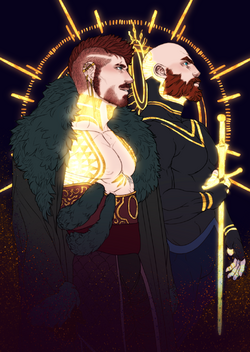
Nolven was a refracted God, a fragment of the Fornoss Vola God Aedán that disavowed that faith, and joined Unionism instead. Nolven however has a split identity due to his fractured nature. In some seasons he is Nolven the god of war and punisher of the enemies of Unionism, smashing idols of other Religions and casting down enemies of the faith, while in other seasons he is Nolven the god of art and beauty who creates art so profound it makes even the most brutish of warriors weep. His fractured identity means he is as unpredictable as the shifting seasons or the tides of the ocean, representing a constant push and pull of destruction and war, and creation and peace. Nolven in times of war has a particular bone to pick with the Pagan faiths of the Regalian Empire.
Nolven is the patron of art and culture, and crusade and iconoclasm at once. He represents the constant flux between creating art to destroy and destroying to create art. In him are embodied the ability of art to dear down systems, ideas, even Empires, and the need for tragedy and destruction to take place to inspire the greatest of artistic expressions. He represents the need for the faithful to be nuanced complex people, to live the spoken virtues of the Gods but with temperance of change and flaw to be true thinking and living people.
Juvin, the Teacher
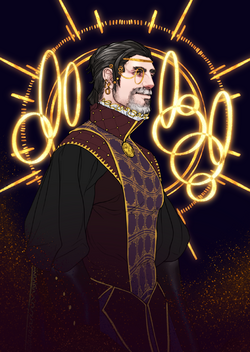
Juvin was the 11th Emperor of Regalia Heinrich III Ivrae, who was both a pious priestly man and a strong contender for the most intellectually gifted Emperor of the Regalian Empire, championing the causes of science and knowledge and dragging the relatively backwater war-like Empire at the time into a more modern understanding of the world. While the Empire expanded in knowledge and piety under his rule, many of its intellectual centers became narrow-minded and chased only dogma information that conformed to their worldview. Despite Juvin's best intentions, his relatively short mortal life did not allow for the institutions he made to survive beyond his reign, many of them folding back into ignorance, leading many to believe Regalia's sciences are backward.
Juvin is the patron God of scholars, teachers, mentors, sages, and scribes. He inspires wisdom to perceive the world and is prayed to for divine insight and inspiration when problems seem unsolvable. It is said that Juvin often appears in the largest of Imperial archives, seeking to help scholars. In a stroke of irony, priests have made this archive inaccessible, fearing the wrong information would be exposed to Juvin, thus creating more ignorance. Juvin's tragedy is that his desire for inspiring wisdom and learning is yet restrained by the clergy.
Mendes, the Bestower
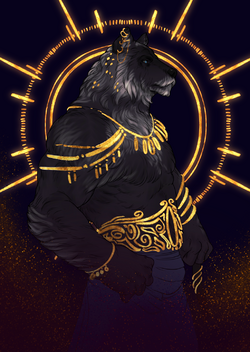
Mendes came to Unionism as a former Khama God, once belonging to the Dewamenet Empire but fleeing the Pearl Wars and eventually joining the Regalian Empire with his flock. Mendes was the leader of the Golden Fleet, an Asha migrant fleet that had grown tired of running, and wanted to settle. Mendes led them to Regalia, where an agreement with Theomar was struck for them to live in Regalia, becoming the first large foreign migrant wave. Mendes then became a prosperity God for Unionism in continuation of his prior role in the Khama faith. There are still those in the Khama faith who try to draw him back to their pantheon, but he insists he is not interested in subjecting himself to Tjafar, and has found true wealth of belonging under the Everwatcher.
Mendes is the patron God of merchants and traders, of shopkeepers and of bureaucrats working in finance. He is prayed to for good fortune and fair winds for trade ships, and sometimes even talked with regarding financial deals or plans. Mendes is one of the few Gods that can reliably be found in one singular location: The High House of the Imperial Coinage, though access to him is extremely restricted to only those deemed of sufficient piety by the priests, which is a tall order in such a viciously crook-capitalist field.
Al-Asir, the Creator
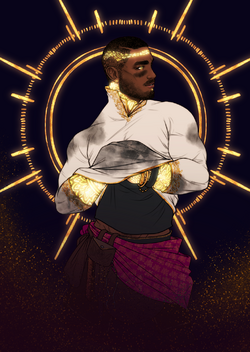
Al-Asir came to Unionism very recently as the Dragon Marik was re-birthed by the Everwatcher even before the return of Dragons. Al-Asir is a technician God, an engineer of kindness at heart who seeks to make the world a better place. Yet, his nature brings about some controversy, particularly among the Skyborn and Dragonborn. His nature as Marik is not disputed, rather, the Dragonborn claim he is Marik first and Al-Asir second, while the Skyborn claim he is Al-Asir first and Marik second. Which version is truth matters to these people, due to their long historic animosity and continuing wars in their homeland of Ard-al-Nur. Al-Asir continues to dance between truths, preferring to show kindness to all instead of choosing one side.
Al-Asir is the patron of engineers and technicians, but also more widely speaking for everyone seeking to do kindness without payment. While his technician-God themes are obvious, Al-Asir is also a God of good-natured hospitality, well-wishes, gratuity, and charity to others. He uses his technology to improve the lives of others and ease their suffering, a stark contrast to the Regalian Empire's wide usage of technology to wage wars and more efficiently kill, something that he has said deeply troubles him.
Schism Gods
The Schism Gods are not members of the official pantheon and should be seen as optional or additional Gods. Each Schism God represents a belief that is technically against the dogma of the main religion, but is acceptable within the margins to promote religious cohesion, and to prevent the faith from fracturing into 5 different versions of Unionism. These Gods are tolerated on the fringes of Unionism, but there is still a healthy amount of internal conflict and derision against those that hold to the Schismatic beliefs that some of the dogmatic believers find repugnant.
Morgan, the Wicked
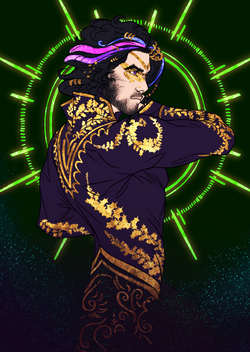
Morgan is a complex character from a historical point of view. He is remembered as one of the worst Chancellors from a moral perspective, but one of the best from a pragmatic perspective. Morgan was cruel, sadistic, extravagant, and immensely skilled, controlling nearly every layer of Regalian upper class society by himself and leaving behind permanent imprints on whatever he touched that have lived long past his death. Among Guided Unionists (those that worship him), the belief is held that Morgan is like an eternal mirror of self-reflection upon the corrupting qualities of the most blessed of the Empire. While propaganda upholds that he was unequivocally an evil man, reality reflects a more complex image from which other lessons can be learned.
Guided Unionists see Morgan as an example God to be fear-worshiped for humility, respect, and loyalty. Through him, Guided Unionists question the narrative, question the information they are fed, and hold their leaders and clergy to account. This makes Guided Unionist a schismatic belief because it goes against the grain of the infallibility of the clergy. Guided Unionists reject the clergy in favor of lay priests who ask them why, instead of commanding them how. Guided Unionism is particularly prevalent among Anglians and Cantaluna Ailor.
Belialus, the Everchanger
- Note, some of this lore relies on a Spirit/Magic rework that is not yet released. As such, some info may be contradictory to current lore.
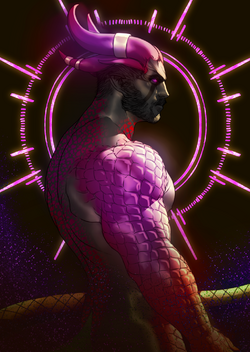
Belialus is a Demon, no ifs and buts about it. Belialus submitted himself to Unionism and the Everwatcher early, just after Theomar's death. The kneejerk reaction of the faithful at the time was to utterly reject him and his followers, thus resulting in the first Schism which resulted in a lot of violence and the eventual expulsion of the Evintarian believers to the isle of Aetosil outside of the Empire. Belialus is a Demon-God not unlike the Arken-God refractions, yet different. He represents the desire of Spirits to live in Aloria and become part of the Alorian fabric of life, but on the terms set out by the Everwatcher and in rejection of their nature. Belialus himself is a Demon of Change, and has brought the Saint-Demons of Changing Fates with him to bless the people with their gifts.
Belialus is perhaps best explained as the Patron-God of those who deal with Demons and otherworldly entities. This makes him the most controversial of the schismatic Gods, because he stands almost directly opposed to Grace (who has tried to kill him at least three times already). Belialus himself, however, is repentant of his Demonic nature, and his followers both preach safe conduct with otherworldly entities and Veilwalking, while bowing to the Great Way. Note, even if Belialus worship is legal, Spirits are still deemed illegal in the Regalian Empire. Belialus worshipers are also routinely targeted by vigilantes of the dogmatic belief, who inflict violence on them despite the official acceptance of their schism.
Finell, the Tidelover
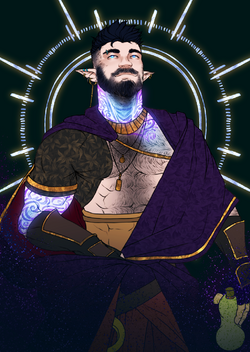
Finell is the closest Unionism has to a love-god, as the majority of the Religion is quite chaste in its approach to intimacy. Finell was once an Elven Prince and the first of the Finul Elves and patron of Bel Faiaal. He ascended Godhood in life, becoming an unofficial God of revelry, party and pleasures to the Elves. The Empresses however rejected him, because he was wild and uncoordinated, his self-serving attitude and apathy to the virtues of perfection a contradiction to the faith. He was banished from the Allorn Empire and became a sea-wandering God only occasionally interacting with his people, until one day he set foot in Regalia and never left. Thus, he became the Enelon Unionist schismatic god of love and revelry who bends the Great Way to far beyond its original intentions.
Finell preaches for the virtues of Unionism, the Great Way, to extend beyond the confines of legal authority, and to break down the barriers of decency, arbitrary law, and heritage. Finell preaches for unrestraint normalization of love and intimacy for all, to do away with jealousy, and to break down heritage and culture barriers, and homogenize all people of Aloria into one loving unity. Many of the dogmatic believers reject Enelon Unionism as debauched and adulterous, while Enelon faithful chastise the dogmatic believers for being culturally divisive.
Schismatic History
While Unionism professes a need for all people to unite under the Regalian banner, its history has shown several conflicts within the faith that have led to various schismatic groups forming over the centuries, often leading to violent confrontations. Below is a short synopsis of the various schisms within Unionism's history.
The Evintarian Schism
Following the death of Emperor Theomar, discussions regarding Unionism's future led to the convening of the First Conclave, where all celates met up to discuss matters of the faith. During the conclave, one group of celates began to draw the ire of the others. Known as the Evintarians and led by a celate by the name of Horopados, these celates argued that while the soul of creation is made in flaw and sin, the body is equally born in flaw and must be improved during existence to comply with the Everchanger's judgement. While activities such as meditation and exercise were one such option, the Evintarians also advocated for occult methods, such as utilizing magic to overcome one's natural weaknesses or by engaging with Demons. To emphasize the latter point, the Evintarians cited the desire of the Demon Belialus to submit to the Everwatcher, while suggesting that other Demons could likewise prove beneficial allies to Unionism.
This assertion that Demons could be bargained with for benefits caused the conclave to declare the Evintarians as heretics, with a violent mob driving Horopados and his followers out of the capital into exile. This exile was notable, because the population that held Evintarian beliefs was fairly large. Modern estimates holds that almost 40% of the initial Empire's population was sent into exile with Horopados to the south, though it should be noted that much of this population was once the inhabitants of the Kingdom of Amelore that existed before the Regalian Empire, and thus they already had large interactions with Magic. While some Evintarians travelled to the distant lands of the Tsaiqvanes & Krakimardik, the majority of Evintarians settled on the remote island of Aetosil and continued to develop ways to engage with Demons without falling victim to their many traps. The Evintarian community thus became known as Aetosians, though Evintarian is more commonly used in Regalia. The Evintarian Schism was mended under the rule of Emperor Alexander I by re-integrating them into the Unionist Divine or the one unified church.
Evintarian Saints
A strong aspect of Evintarian Unionism is to hold Evintarian Saints to a higher devotion than even the usual Saints of default Unionism. Saints as a concept are mortals who served the Gods during their lifetime or after, and were as such raised up as great examples of virtues to the Great Way. Evintarian Saints are not necessarily recognized by those who do not hold Evintarian beliefs, but are very important to the Evintarians. Each of the Saints has an Aetosian Name (Byzantine Greek), which usually follows a common first name and a titular suffix. For ease of conversation the suffix can often be ignored.
-
Alexander Koinonikos
-
Frederick Steiros
-
Gnosteon Phanoteros
-
Kraton Chrysoforos
-
Dikaios Sofophron
-
Yvasios Genesiophoros
- Alexander Koinonikos (Alexandros in Aetosian) is the Emperor Alexander I of the Regalian Empire. Alexander is held as an Evintarian Saint (on top of also being the Vessel of the Everwatcher), because outside of his divine status as the mouth of faith, he worked to re-unify the separate church bodies into one Unionist Divine. Before Alexander, the Evintarian, Guided, Supremoclast, Dogartan, Priscille and Diviner sects all kept seperate and had differing legal status. Through secular guidance and spiritual effort, Alexander convinced the colleges of each sect to sign the Divine Declaration which re-unified the church bodies, albeit allowing the sects to retain some individual autonomy, and not forcing the main dogmatic body to accept all schisms as true. The only church body that refused the Divine Declaration were the Diviners, who are declared heretics to this day.
- Frederick Steiros (Frederikos in Aetosian) is the second born son of Emperor Alexander I of the Regalian Empire, Prince Frederick. Prince Frederick during a campaign to Jorrhildr and Ellador, accepted co-habitation with a several centuries old Demon Urlan elder, who became an Undead Spirit centuries ago and eventually turned into an Eternum Demon. With the unified power of the Prince and the Demon, Prince Frederick led the charge against the Death Isldar during the Isldar civil war, and showed super-human combat abilities to defend the faith, while also submitting his own body and mind to the unity with a Demon. The Saint Frederick is considered a saint of loyalty and sacrifice, a willingness to lose the self for purpose.
- Gnosteon Phanoteros is a Dictat Demon who was swayed by Belialus to join the Unionist fold and submit under the Everwatcher. Gnosteon leads the Oikos Mathēmatōn (House of teachings) in Aetosil, a massive library that contains the Evintarian priesthood's personal archive away from the Unionist church's main archives. The Oikos Mathēmatōn are considered an "occult version of the spiritual archives", which is why they have a somewhat controversial reputation among the other Unionist bodies. Gnosteon is considered a guide and divine inspiration, unlike other Dictat Demons it does not demand anything in return for its divine inspiration, but also does not grant it by giving simple answers. Gnosteon will beg questions, and teach rhetoric, so that the answer isn't apparant, but the person is always equipped with the steps for how to reach that end-goal. As a result. Gnosteon is held as the Saint of knowledge and teaching, and example of the need not to solve other people's problems, but teach them.
- Kraton Chrysoforos is a Vortex Demon bound to a marble statue in Aetosil that comes to life in two conditions: if it is challenged into a duel by a mortal, or if the isle of Aetosil is under attack. Kraton was already present on Aetosil when the exiled Evintarians arrived there due to its Allorn history, and was so moved by the virtue and will of the people that it declared itself a protector, and then subjugated under the teachings of Belialus to the Everwatcher. Kraton embodies the will of the people to have the strength to resist adversity and opposition. Strong warriors measure their ability against the Demon, as it is considered unbeatable, but will always speak to those it defeats to explain why they lost, and how they can get better. To many Kraton is also an example of the beauty standard, but that is more often assigned to Yvasios instead. In short, Kraton is the Saint of martial ability, of bravery and of virtue in defense or others, one's self, and the ability to improve physically.
- Dikaios Sofophron is the mortal body of one of the Dukes of the Evintarian lands in the Regalian Archipelago, that as punishment for his cruel and wroth rule of his domain, accepted the command of Belialus who joined his mortal body with an immortal Demon soul from the Eidolon. Dikaios then became an example in virtuous rule for all others with secular or spiritual leadership. They show the good graces of justice, mercy, compassion, kindness, and trusting of the good will of the people. Dikaios confronts other Nobles and those of blue blood with the fact that deeply despise the common folk, that they have such loathing hatred for the whining and complaining of the lower classes, and as a result become cruel and resentful of their divine duty to administer in the name of the Emperor. Dikaios as such is a Saint of just rule and good leadership.
- Yvasios Genesiophoros is a Hollow Demon who already lived on Aetosil when the Evintarian exiles arrived, but took some time to warm up to their presence as she still inflicted death on the locals. Eventually, a chance encounter with Gnosteon brought Yvasios around to the teachings of Belialus and the Everwatcher, in the idea that the death she sought did not necessarily need to be inflicted on the concept of life, but could be re-directed onto the idea of have-beens, past-lives, and would-be-lives. The idea was that Yvasios would travel the land and discover those who had hidden selves and identities that needed a push to be brought to the fore. she found a man who felt inside to be a woman, she found an unmarried woman who inside felt destined for motherhood, and she found another Demon that wanted to be a person. By aiding all to see their true self, she could find her release in killing what could have been, and giving reason or existence to what should be, thus helping the people become their true self. To cap off her achievement, Yvasios killed her old self by doing away with her identity as a non-gendered Demon, and adopting fully the feminine qualities of the mortal world. She is the first officially recognized Demon who accepted a mortal gender distinction in the Unionist Faith.
Priestly Activities
The Unionist College (what the church of Unionism is collectively called) is a vast sprawling network of clerics and clerks that combine ecclesiastic and secular control of the people. It is a difficult to understand organization, due to its many obvious and less obvious interconnected agencies and organizations that are not always aware of each other. The Unionist College could be considered a state within a state, it has its own army, its own secret service, and its own ministerial positions as well as its own treasury. There is a constant tug and pull between the Regalian Empire's nobility, and its clergy, who wield the words of the prophets to get their way. To many, this makes the Unionist College a very powerful enemy. Indeed, while many of the rank-and-file priests may have good intentions, the Unionist College is a strong political component of the Regalian Empire, one that is just as self-interested and perhaps corrupt as the secular rulers are. On the ground, priests are called either priest or Celates, who in turn control a Celery. A Celery is a grant of land given to a priest by a secular ruler of the Emperor, or a higher priest, with the intent to administer to the flock or manage a monastery or nunnery in the area. While most priests of other religions are purely invested in religious teachings, Unionist priests are very much nobility in their own right, with tax dues and subjects who pay tithes and often even serve in the ecclesiastic guard. When playing a priest, any kind of role is viable, whether you want to play a corrupt priest who is using the words of the Gods for their own benefit, or a priest who is trying to make the best of a difficult situation and guide the flock to the best of their abilities without falling to vice.
Expanded Lore
The Expanded Lore section contains additional contextual information about the Unionist faith. This section is not necessary to read to get a good understanding of the lore, just the background information.
Priestly Hierarchy
The Unionist College contains several ranks of priests, known as Celates. Higher officeholders are considered more versed in theological and bureaucratic knowledge. Below is a list of all priestly ranks in increasing order of seniority.
- Lay-priests are not part of the Unionist College, but are mentioned here due to their close association with the clergy. Lay-priests are faithful Unionists who act as community leaders and assistants to priests. Anyone can play a lay-priest, as it only requires rudimentary knowledge of Unionist theology.
- Celates are the rank and file priests in Unionism, and are responsible for spiritual outreach, guiding theological discussions, and maintaining the temples. Prospective Celates attend seminary classes next to a major Temple for several years, until being ordained by another Celate. Anyone can play a Celate.
- Everians are a senior priest equivalent to a secular Duke. They are assigned to a major Temple in an urban center and oversee several Celates under them. They also serve as secular rulers over large areas and are more political than a regular Celate. Everians are played as NPCs.
- Concilly Councilors are priests who oversee the Unionist College as a whole. Only a handful of Everians are chosen to become Concilly Councilors, with political deals and secular authorities greatly influencing the appointments. The Council used to be led by a Supreme Everian chosen by the Emperor, but the position has remained unfilled since the Ultor Incident. Concilly Councillors are rarely played as NPCs.
Writs of Sin
Writs of Sin are declarations made by the Collegiate of Unionist priests, that declares an individual in contempt of the divine will of the Everwatcher, and the virtues of the Gods. While Unionism does not exactly have sins to violate and be deferred from the Afterlife, doing the exact opposite of the virtues that the Gods preach, is considered sinful. Common Writs of Sin are issued against deserters, traitors, blasphemers, and those who abandon their duties with pride and contempt. Note, Writs of Sin are not issued for individual sins or crimes, because Unionism has the core idea that every living person is born in sin, and that living a sin free life is both pretentious and impossible. Writs of Sin are specifically issued against those that sin against the better good of the state, or whose sins are prolific, systemic, or symptomatic of an underlying personality problem.
Declaration of a Writ of Sin
It should be important to always consider Writs of Sin partisan statements made by priests, even if they assume the mantle of impartial theological judge. Writs of Sin are one of the few levers priests can use to apply social, political or spiritual pressure in Regalia, though many priests also just do it because they believe in the ideological intent of a Writ of Sin: to apply extreme pressure on a person to change their ways or acknowledge the error in their actions. Still, Writs of Sin can also be issued for political reasons, as it may cause a person to be caustic to ally towards, and isolate them from creating a wider political or social platform by making it far less appealing for Unionists to work with them.
Writs of Sin on non-believers
Writs of Sin can be issued against non-Unionists, which at first glance may not have any immediate effects. After all, most faithful of different religions tend to interact with their own kind, and non-Unionists do not put much stock in the word of Unionist priests. That being said, Writs of Sin against non believers can still apply in context to the state of Regalia and its intents, and also in terms of soft-pressure consequences. Letters of Commendation from those with a Writ of Sin become worthless, and some Event DM's or NPC's may react hostile to a character that has a Writ of Sin issued, due to the fundamentals of their faith. A Character with a Writ of Sin issued is never denied access to activities like Assemblies, but may find that a lot of peripheral interactions with the wider political platform become more difficult, or just not as smooth as they used to.
Process of the Writs
Writs of Sin can either be declared with no real process, or through a Holy Inquest. There is no standard protocol for Holy Inquest, essentially a priest can create a kangaroo court in whatever way they like, because ultimately their judgement is what issues the Writ of Sin, not an impartial third party. While priest Characters must always ask for validation from Lore Staff in a Ticket before a Writ can be issued (and then Staff also issue it for them), these Writs are always issued by the Priests who co-sign them, not an off-screen NPC College of Priests. As mentioned earlier, Writs of Sin are partisan clerical actions, and should remain within the realm of Player interactions. They can only be issued between player characters, and only be resolved between player characters, no NPC entity or College of Priests will ever intervene.
Removing a Writ of Sin
Removing a Writ of Sin is not entirely straightforward, but it must always come from a priest, either the one(s) who issued the Writ, or an entirely unrelated. When Writs of Sin are issued, they have specific names attached, and Lore Staff will endeavor to also list Priests who did not co-sign the Writ, either because they were not made aware, or because they disagree with the conclusion. People who have Writs of Sin issued against them can either approach the ones who issued the writ, or the ones who did not, and try to blackmail, coerce, convince, repent, bargain, or bribe their way back into good graces. Lore Staff exist only to ensure the Writ is issued with legitimate theological arguments (and not "he spilled a drink on my dog" rhetoric), and equally will ensure proper rhetoric supports the removal of a Writ. Legally speaking, a Writ can only be removed if a theological argument can be cited to prove the subject has either repented or moved beyond their wicked ways, but the priest(s) who issued the Writ can also revoke it without citation. The only thing players should be aware of, is the idea that favoritism and bribery is generally considered Writ of Sin worthy in itself, and priests can also have Writs of Sin issued against them for doing exactly that. Corrupt priests do exist, however.
In-lore Writ effects
A Writ of Sin has a lot of in-lore effects, that may not always express themselves in the roleplay experience. Due to the habit of players to play lip-service Unionists, not all characters may take a Writ of Sin (and the subsequent implication of a non-grata declaration) seriously, and treat such a person as the outcast they might have been declared. While it is technically "wrong" to do so, lay persons and secular individuals not related to the clergy may also object to a Writ of Sin out of personal conviction, but should be careful not to say this out loud, as this may result in the Writ of Sin extending onto them. Generally the purpose of a Writ of Sin is to socially isolate someone. If their allies or next of kin disregard the religious meaning of a Writ of Sin, they are generally held in contempt of the clergy, which in itself can have negative side effects for them unrelated to the Writ of Sin. In lore, a Writ of Sin might also result in denial of service in shops, refusal to attend worship at Temples, and denial of communication with certain government institutions, but experiences on this may vary due to afore mentioned lip-service Unionists.
Organizations
Unionism has several organizations which fall under the control of the Unionist College. Below are a few of the most notable of these groups.
- The Nonnatean Order is an ascetic organization of lay-priests tasked with supporting Unionists through difficult times, chiefly during the deaths of loved ones. They are also known as Silent Sisters, as their work done during burial rites is performed in complete silence. Nonnateans either wear the robes of a nurse or the habit of a nun, with some donning a face mask to symbolize humility and blind service to the faith. Most Nonnateans live in abbeys close to the local temple, though some also live in aristocratic manors as personal aids to the nobility. Anyone can join the Nonnateans, though doing so requires taking monastic vows, a decision few are willing to make.
- The Dogartan Order is another ascetic organization of lay-priests who reject the wealth and politics of the Unionist College to live humble lives in service to others. They are known as the Pious Brothers, due to their strict vows of poverty and monastic living. Despite their simple lives, the Dogartans are famous for their apiaries which produce some of the best honey and mead, which endears them to the local population. Dogartans wear the robes of monks and friars, and also live in abbeys close to temples. Anyone can join the Dogartans, though doing so requires taking monastic vows, a decision few are willing to make.
- The Helerian Order is the military branch of the Unionist College, comprising an army and navy. Everians who attended military academies serve as officers within the Helerian Order, with the rank and file filled with veteran Tenpennies and religious volunteers. The Helerian Order rarely deploys alongside the Regalian Mlitary, instead providing security and transportation for the Unionist College. The Helerian Order is an NPC organization.
Trivia
- Unionism used to be mandatory for nobility somewhere during the second century after Cataclysm, though this Holy Law was removed when the war against the Skagger Horde ceased, and the Empire benefited more from including non-Unionists into the peerage. An exception had always been made for the Solvaan nobles in Solleria however, called the Confessions of Melennar.
- Sectarian violence largely came to an end at the turn into the fourth century as the last attacks on Vultragon Unionist by state forces ceased, and an uneasy truce was signed between the Schism religious communities. They still do not see eye-to-eye, and the different Schismatic groups still prod at each other, but instead of murdering each other over sectarian differences, they mostly fight with words nowadays, a legacy of the Kleine Rechnung, the document that called for the truce.
- Despite Caan's absorption into Unionism, the Breizh still maintained a high level of cultural autonomy, some even clinging to old beliefs. As such, even when Magic became illegal in the Empire, the Breizh Aelrrigan Order continued to find and train Mages safely in their sanctuaries while the rest of the Empire turned to brutal oppression (and the Magic part of Caan was suppressed from dogma). Caan' faithful among the Aelrrigan Order are commonly cited as the reason why Magic acceptance eventually returned, and Caan' magical nature in theological teachings was returned.
| ||||||||||
| Accreditation | |||||||
|---|---|---|---|---|---|---|---|
|
| ||||||
